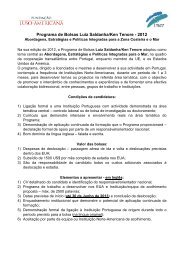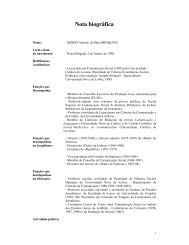You also want an ePaper? Increase the reach of your titles
YUMPU automatically turns print PDFs into web optimized ePapers that Google loves.
will face choices regarding the extent to which its new engagement<br />
in the Gulf (the “Istanbul Cooperation Initiative”) and<br />
even further afield, is eventually merged into a wider Mediterranean-Middle<br />
East strategy. Within the Mediterranean, Libya<br />
may well join the Dialogue. A radically refashioned NATO might<br />
even embrace Israel and other interested southern Mediterranean<br />
states in a strategic southern enlargement. In both the<br />
western and eastern Mediterranean, integration within existing<br />
Euro-Atlantic institutions may be a viable alternative to the<br />
creation <strong>of</strong> new security architecture in the south. If the public<br />
diplomacy obstacles can be overcome – a big “if” – countries<br />
like Morocco and Algeria might well prefer to “borrow”<br />
security from proven institutions in the north 48 .<br />
Outlook for a Transatlantic Approach<br />
Differing European and American approaches to the Mediterranean<br />
are accompanied by substantial variations in interest and<br />
policy within the EU itself. In the post-Cold War era (and even<br />
during the Cold War), attention to the development and stability<br />
problems <strong>of</strong> North Africa and the western Mediterranean<br />
has required the consistent lobbying <strong>of</strong> key southern European<br />
countries, including France. Today, the recognition <strong>of</strong> the region’s<br />
importance in strategic terms is more widely shared, and this<br />
is reflected in more active bilateral and multilateral engagement<br />
49 . Portugal has been part <strong>of</strong> this trend, with an enhanced<br />
program <strong>of</strong> bilateral diplomacy (e.g., annual summits with<br />
Morocco, Algeria and Tunisia, and increasingly vigorous economic<br />
and cultural diplomacy) 50 . Yet, key southern European<br />
actors, including Portugal, will likely find it hard to pursue a<br />
sustained agenda in the southern Mediterranean without engaging<br />
European and transatlantic partners.<br />
[51]<br />
48 Even in the<br />
context <strong>of</strong> existing<br />
activity, public<br />
diplomacy has<br />
become a leading<br />
facet <strong>of</strong> the<br />
Dialogue, including<br />
a steadily increasing<br />
pace <strong>of</strong> expert<br />
meetings, outreach<br />
and information<br />
activities. For the last<br />
few years, Portugal<br />
has served as the<br />
NATO “contact<br />
country” for<br />
Morocco. See the<br />
compendium, NATO<br />
Public diplomacy for<br />
Mediterranean<br />
Dialogue and ICI<br />
Countries Following<br />
the Istanbul Summit<br />
(Brussels: NATO, 2006).<br />
49 See various<br />
analyses on this<br />
theme in Andreas<br />
Jacobs, ed., Euro-<br />
-Mediterranean<br />
Cooperation:<br />
Enlarging and<br />
Widening the<br />
Perspective, ZEI<br />
Discussion Paper<br />
C131 2004 (Bonn:<br />
Center for European<br />
Integration Studies,<br />
2004).<br />
50 Portugal<br />
has bilateral<br />
friendship<br />
and cooperation<br />
agreements with<br />
Morocco (1994),<br />
Tunisia (2003), and<br />
Algeria (2004),<br />
and a roster<br />
<strong>of</strong> high-level<br />
meetings<br />
and expert-level<br />
mixed commissions.

















